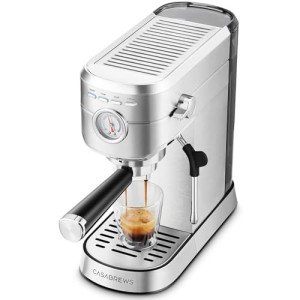The World of High-Quality Espresso Machines: A Comprehensive Guide
Espresso has become a cherished beverage among coffee enthusiasts worldwide, known for its rich flavor, intense fragrance, and adaptability. The heart of an excellent espresso depends on the machine utilized to brew it. High-quality espresso machines are designed to deliver the perfect shot, making them a necessary investment for coffee lovers. This short article checks out different types of high-quality espresso machines, their functions, upkeep suggestions, and responses to regularly asked concerns.
Types of High-Quality Espresso Machines
High-quality espresso machines fall under numerous categories, catering to different preferences, skill levels, and spending plans. The primary types consist of:
| Type of Machine | Description | Ideal User |
|---|---|---|
| Manual Espresso Machines | Requires user ability to manage extraction and pressure. Uses the most control over the brewing procedure. | Experienced baristas and enthusiasts |
| Semi-Automatic Machines | Integrates manual operation with automation. Users control the grind and tamping, while the machine handles water dispersion. | Intermediate users |
| Automatic Espresso Machines | Automate the brewing procedure, permitting programmable brewing times and temperatures. | Casual coffee drinkers |
| Super-Automatic Machines | Have integrated grinders and are fully automated, dealing with whatever from grinding to developing and steaming. | Users seeking benefit |
| Commercial Espresso Machines | Developed for high volume use in cafes and restaurants, providing toughness and speed. | Entrepreneur |
Detailed Overview of Each Type
Manual Espresso Machines
- Pros: Complete control over the brewing process; can produce extraordinary quality espresso.
- Cons: Requires considerable skill; time-consuming.
Semi-Automatic Machines
- Pros: Balanced control, blending manual and automatic procedures; exceptional quality espresso is still possible.
- Cons: Requires some understanding and experience to master.
Automatic Espresso Machines
- Pros: User-friendly; decreases the learning curve while still producing high-quality espresso.
- Cons: Still requires some understanding of coffee-making essentials.
Super-Automatic Machines
- Pros: Maximal convenience; little skill needed; suitable for people or households who desire coffee without difficulty.
- Cons: Higher rate point; might do not have the fine-tuning capabilities of manual machines.
Commercial Espresso Machines
- Pros: Built for longevity and performance; typically includes functions for high-volume turns.
- Cons: Expensive; might be overkill for home use.
Key Features to Consider
When trying to find a high-quality espresso machine, numerous key features ought to be taken into account:
- Pressure and Pump Type: Look for machines with at least 9 bars of pressure, which is important for drawing out the very best flavor from coffee beans.
- Boiler Type: Single, double, and heat exchanger boilers each impact how the machine performs and the speed of developing.
- Develop Quality: High-quality products such as stainless-steel are more suitable for durability and visual appeals.
- Reduce of Use and Cleaning: Some machines need extensive cleansing, while others are developed for simple maintenance.
- Temperature Control: Consistent temperature level is vital; think about machines with PID controllers for accurate control.
Benefits of High-Quality Espresso Machines
Buying a high-quality espresso machine provides a wide range of advantages:
- Superior Quality: High-end machines enable higher control, causing tastier espresso.
- Sturdiness: Built to last, quality machines require less repairs and replacements.
- Personalization: Users can enjoy a customized experience by changing grind size, shot timing, and other settings.
- Increased Convenience: Automatic and super-automatic alternatives permit enthusiasts to enjoy espresso with minimal effort.
Upkeep and Care for High-Quality Espresso Machines
To keep an espresso machine functioning efficiently, regular maintenance is vital. Here are tips for preserving a high-quality espresso machine:
Descale Regularly:
- Use a descaling solution every few months to avoid accumulation of minerals from water, which can affect flavor and efficiency.
Tidy the Brew Group:
- For machines with a detachable brew group, clean it routinely to ensure a tidy extraction.
Change Water Filters:
- Use a water filter and alter it as needed to reduce pollutants in your brewing water.
Daily Cleanings:
- Rinse the portafilter and group head after each use to avoid oil accumulation.
Watch on the Parts:
- Monitor seals, gaskets, and other parts for wear and tear and change them as necessary.
Regularly Asked Questions (FAQs)
1. What is the best espresso machine for newbies?
For novices, a semi-automatic machine typically offers a good balance of usability and control, allowing users to learn the abilities necessary for making excellent espresso.
2. Are super-automatic machines worth the investment?
Yes, for those who prioritize convenience and ease over control, super-automatic machines can be a worthwhile investment, particularly for households or busy professionals.
3. How much should I expect to invest in a high-quality espresso machine?
High-quality espresso machines range considerably in price, with manual machines beginning at a few hundred dollars, while super-automatic or commercial machines can go beyond numerous thousand.
4. Can Energy-Efficient Espresso Machines make other coffee beverages with an espresso machine?
Yes, lots of espresso machines have steam wands or attachments that permit users to create lattes, cappuccinos, and more.
5. How long do espresso machines typically last?
With correct upkeep, high-quality espresso machines can last over a decade, making them a long-term investment in your coffee satisfaction.
High-quality espresso machines yield a transformative coffee experience, whether taken pleasure in at home or in a commercial setting. By understanding the types offered, their features, and the upkeep required to keep them running efficiently, customers can make informed decisions that elevate their coffee-drinking experience.

